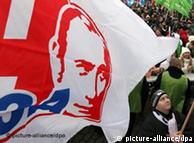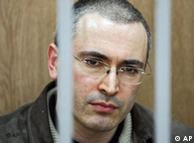RUSSIA | 12.12.2011
Russian tycoon launches presidential bid
Mikhail Prokhorov, a Russian mining tycoon and owner of the New Jersey Nets professional basketball team in the United States, told reporters at a press conference in Moscow on Monday that he intends to challenge Prime Minister Vladimir Putin in next year's presidential election.
"I have made the most serious decision of my life. I am running for president," said Prokhorov.
Prokhorov's challenge follows a botched performance in the Russia's December 4 parliamentary election, in which he formed a liberal party under the tacit approval of the Kremlin, but then abandoned it after what he claimed had been political pressure from higher up. His Right Cause party finished with less than 1 percent of the vote.
 Putin is widely expected to return to the presidencyProkhorov, chairman of the mining company Polys Gold, is considered by Forbes magazine to be one of the five richest men in Russia with an estimated 2010 fortune of some $18 billion (13.5 billion euros).
Putin is widely expected to return to the presidencyProkhorov, chairman of the mining company Polys Gold, is considered by Forbes magazine to be one of the five richest men in Russia with an estimated 2010 fortune of some $18 billion (13.5 billion euros).He has been cautious not to be overtly adversarial toward Putin, but the billionaire could pose a serious challenge to the prime minister's bid to regain the presidency. Putin's authority has been dented by allegations of widespread fraud during the parliamentary election earlier this month.
Moscow tries to channel protests
Putin's United Russia party only won about 50 percent of that vote, compared to 64 percent four years ago, and the fraud accusations have allowed opposition parties to successfully mount large anti-Putin protests.
The Kremlin is working to try to channel the protests, and although it has said there would be no new election, it has openly stated that it would conduct an investigation into the allegations, even if few people expect much to come of that.
Former Finance Minister Alexei Kudrin, a long-time ally of Putin, on Monday called for the creation of a liberal party to fill a void in Russian politics.
Kudrin's proposal could offer a way for Putin to get the upper hand on discontent and reduce the threat posed by the protests and Prokhorov, says Hans-Henning Schröder, from the German Institute for International and Security Affairs in Berlin.
"Of course, he has not announced this all by himself; but rather, it is part of a strategy by the Kremlin to absorb the discontent," he told Deutsche Welle. "Kudrin is supposed to take over the role that was originally seen for Prokhorov."
 Khodorkovsky does not have much leverage behind barsNo united opposition
Khodorkovsky does not have much leverage behind barsNo united oppositionOne thing is clear, Schröder points out, and that is that the new opposition movement emerging from Russia's middle class does not have a leader.
"I don't see a leading figure coming out of the protest crowds," he said. "That is the difference between the current protests in Russia and the so-called Orange Revolution during the 2004 presidential election in Ukraine."
"At the time, leaders came from disenchanted segments of the Ukraine elite, but in Russia, there is a united elite and there is no one emerging who could be brought into position against the Kremlin," Schröder added.
The participants in Saturday's rallies in Moscow appeared to have a similar view of the situation, he said. He pointed out that although there is one opposition figure, Boris Nemtsov, a former deputy prime minister, he has not been able to mobilize any significant segments of the protest movement.
The only leader who could stand up to the Kremlin, in the view of many demonstrators, is the former oil tycoon and Kremlin critic, Mikhail Khodorkovsky - but he has been in jail since 2003 and is likely to spend many more years there.
Author: Roman Goncharenko/Gregg Benzow (AP, AFP)
Editor: Martin Kuebler
Editor: Martin Kuebler
dw

Comments